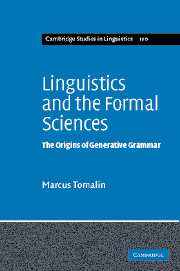4 - Systems of syntax: 1951–1955
Published online by Cambridge University Press: 22 September 2009
Summary
Chapter overview
The main purpose of this chapter is to consider Chomsky's research from the years 1951–1955 in the light of the topics presented in the previous chapters, and, to renew the words of warning in the introduction, it is at this stage of the discussion that the convenient abbreviation ‘TGG’ ceases to be especially helpful. As indicated previously, the main problem is that, during this period, Chomsky explored a number of different approaches to syntactic theory and, though various aspects of these approaches were maintained and further developed, others were swiftly discarded. As a result, it is not possible simply to use the term ‘TGG’ with reference to Chomsky's work of the early 1950s as if it denoted a clear and consistently identifiable grammatical theory. Consequently, it is necessary either to accept that TGG must be viewed as a fluid concept that altered continually during this period, or else to avoid using the term altogether (whenever possible). In this chapter and the next the latter course is adopted, since it necessitates more specific reference to the various ideas that Chomsky explored during this period and so avoids confusion.
The main sections of this chapter focus upon the influences that shaped Chomsky's earliest work. The basic approach is to identify the presence of a particular influence, and then to trace its development as his research gradually matured during the 1950s.
- Type
- Chapter
- Information
- Linguistics and the Formal SciencesThe Origins of Generative Grammar, pp. 108 - 139Publisher: Cambridge University PressPrint publication year: 2006



